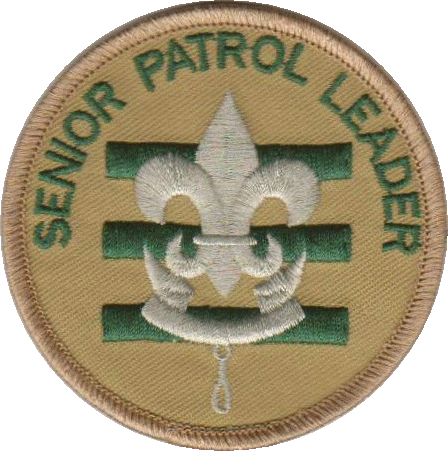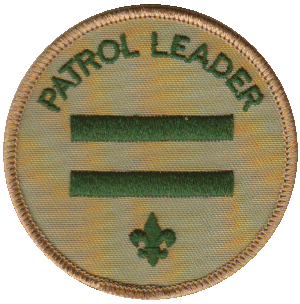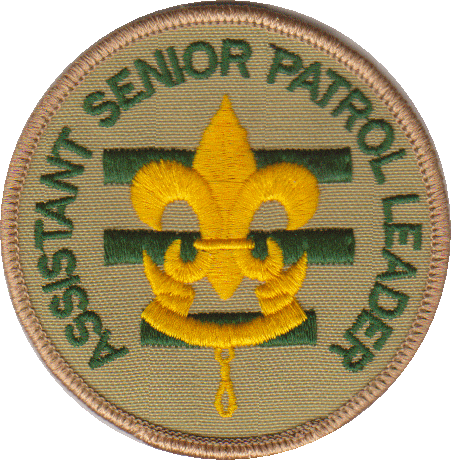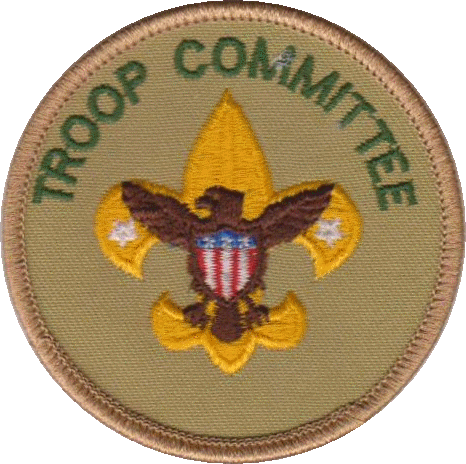Troop 8787 is organized into several operating units, including the Patrols, the Patrol Leader Council, the adult leaders, and the Troop Committee.
Patrols are groups of 6 – 8 Scouts that are the smallest democratic unit of the Troop. Patrols are selected so that, as nearly as possible, boys that enjoy being together are in the same Patrol. If there is a problem, the Scout will need to confer with the Patrol Leader and the Scoutmaster. The Patrols operate using the “Patrol Method” which is described later in this guide.
The following are qualifications for those Scouts in leadership positions:
Senior Patrol Leader 
Star Rank or above
Active in Troop
Has completed or agrees to complete Silver Pines Leadership Training
Agrees to continue leadership training
Understands obligations and is prepared to meet them
Scoutmaster’s approval
Election by Troop
Attends Patrol Leader’s Council meetings
Patrol Leader
Active in Troop
Completes Junior Leadership Training
Understands obligations and is prepared to meet them
Scoutmaster’s approval
Election by Patrol
Attends Patrol Leader’s Council meetings
Leadership Corps
(Junior Assistant Scoutmaster, Senior Patrol Leader, Assistant Senior Patrol Leader, Troop Guide, Scribe, Historian, Librarian, Quartermaster, Troop Instructors)
Agrees to continue leadership development
Practice such demonstrated leadership
All leadership positions have a 30 day probation period. It is the Scoutmaster’s option to dissolve a position if needed. The Scoutmaster will have a conference with the Scout first.
 The PLC (Patrol Leader Council) is comprised of the Senior Patrol Leader, Assistant Senior Patrol Leader, and the Patrol Leaders. It is their job to plan and run the programs of the Troop, under guidance of the adult leadership. The Patrol Leader Council (along with the Troop Scribe who is a non-voting member) meets periodically, generally the Sunday following the monthly weekend activities, to plan the Troop meetings and the upcoming monthly weekend activities.
The PLC (Patrol Leader Council) is comprised of the Senior Patrol Leader, Assistant Senior Patrol Leader, and the Patrol Leaders. It is their job to plan and run the programs of the Troop, under guidance of the adult leadership. The Patrol Leader Council (along with the Troop Scribe who is a non-voting member) meets periodically, generally the Sunday following the monthly weekend activities, to plan the Troop meetings and the upcoming monthly weekend activities.
The role of the Leadership Corps is to set an example for the Troop, plus provide role models for other Scouts, giving other Scouts something to shoot for and provide:
Scouting skill instructors
Temporary patrol leadership
Advisors to new patrol leaders
Troop leader training staff to assist Scoutmaster
Service corp. for camp outs, camp-o-rees, and special events
Organization and preparation for special activities.
The adult leadership is comprised of adults 18 years of age or older, whose function is to guide the Scouts in the execution of the program, especially with regard to the aims of Scouting (Character Building, Citizenship, and Physical Fitness). We strongly recommend that all scout parents try to be part of our adult leadership team. Quite simply, the more involved parents are, the better their sons do in scouting and the farther they will advance.
 The Troop Committee acts as the “ways and means” committee of the Troop. It is the committee’s responsibility to provide the resources to run the Troop’s Scout program, including leadership, activities, funding, equipment, facilities and sites, training and communications. All parents are urged to register and attend all committee meetings. The Adult Leaders request that parents volunteer for committee positions and may ask parents to fill a committee position..
The Troop Committee acts as the “ways and means” committee of the Troop. It is the committee’s responsibility to provide the resources to run the Troop’s Scout program, including leadership, activities, funding, equipment, facilities and sites, training and communications. All parents are urged to register and attend all committee meetings. The Adult Leaders request that parents volunteer for committee positions and may ask parents to fill a committee position..
Parents are welcome to observe Troop meetings. Meeting times are noted on the calendar. The “Chain of Command” revolves around the Senior Patrol Leader and/or Troop Guides who leads the PLC in conducting the program. He serves as the channel of communication between the patrols and the adult leaders. Scouts with questions or needing assistance or guidance should go first to their patrol leader, who in turn should go to the Senior Patrol Leader, who will then go to the Junior Assistant Scoutmaster and then to their assigned Assistant Scoutmaster, if needed. The success of the program revolves around the effectiveness of the Patrol, PLC, and Adult leadership.

Recent Comments